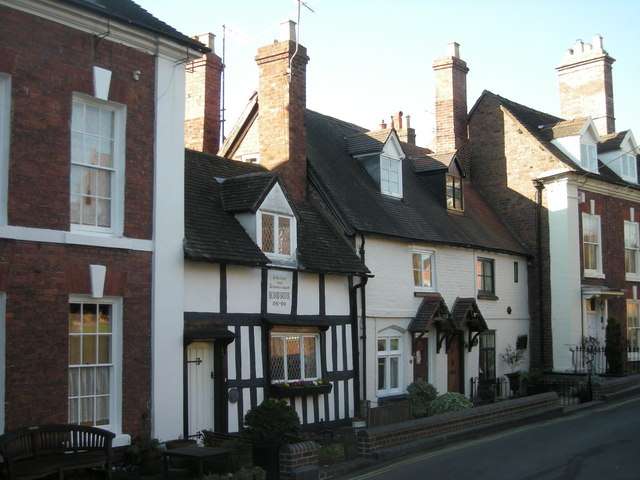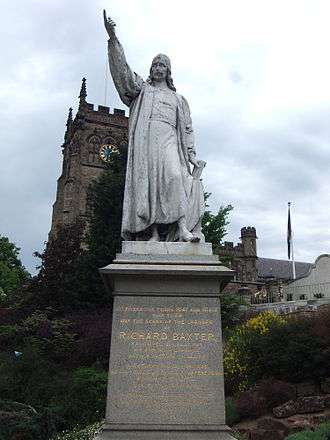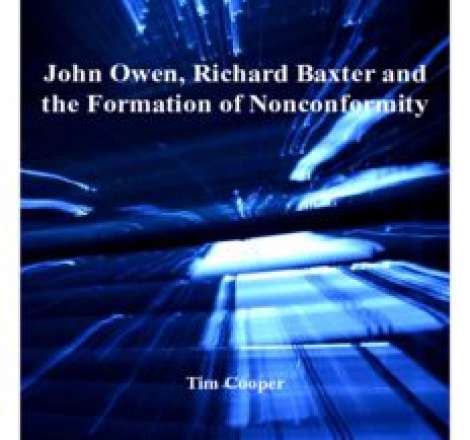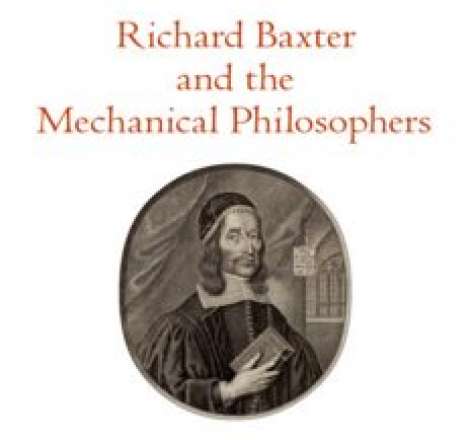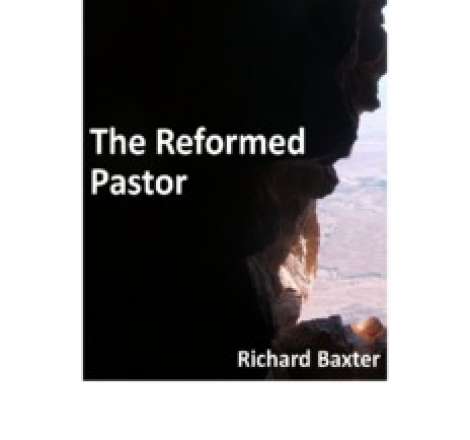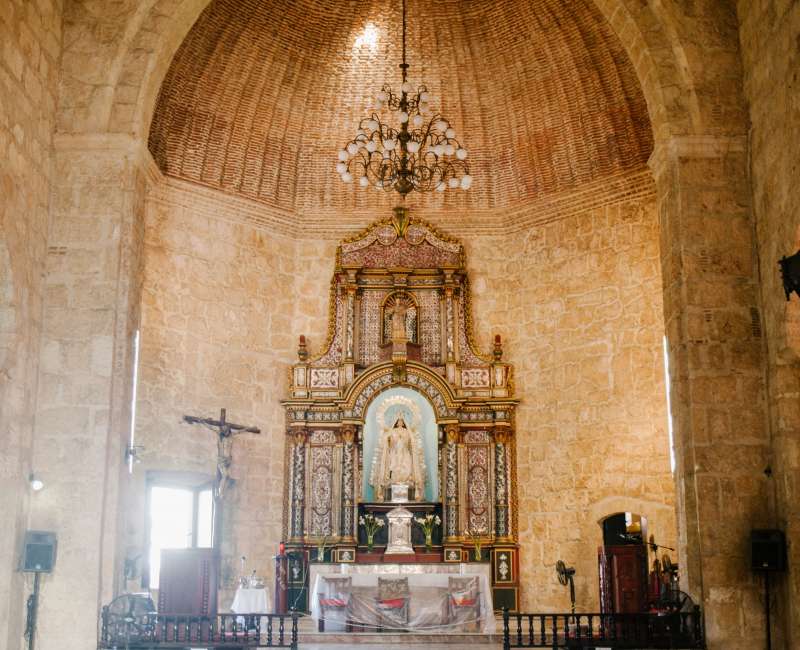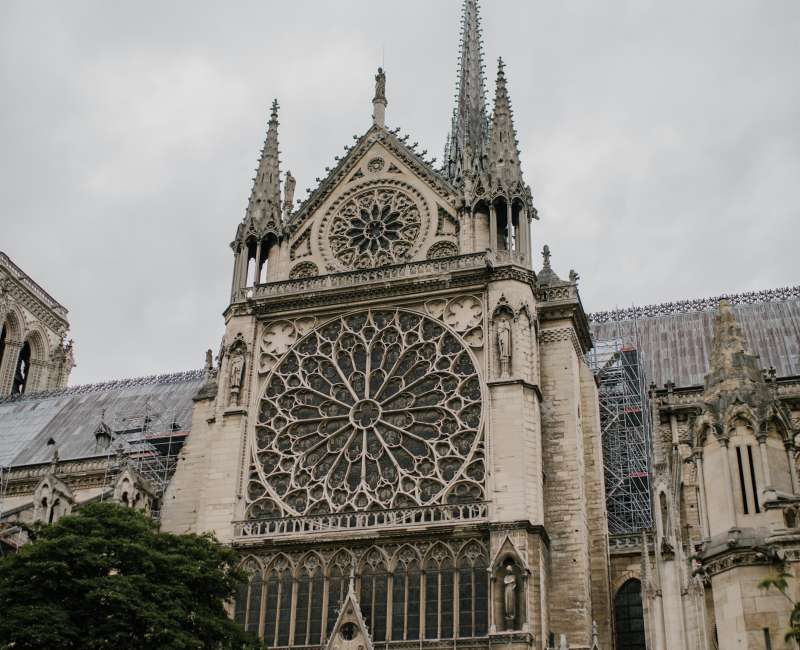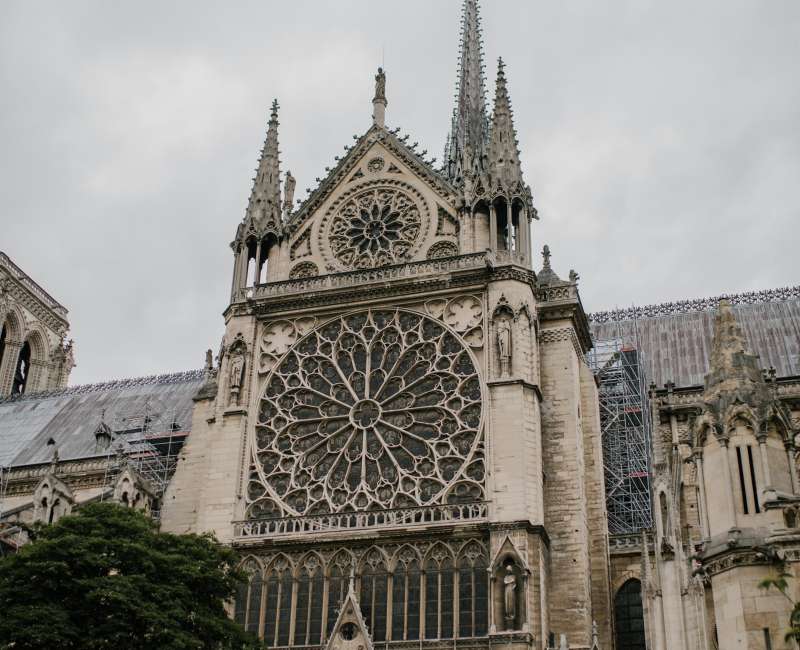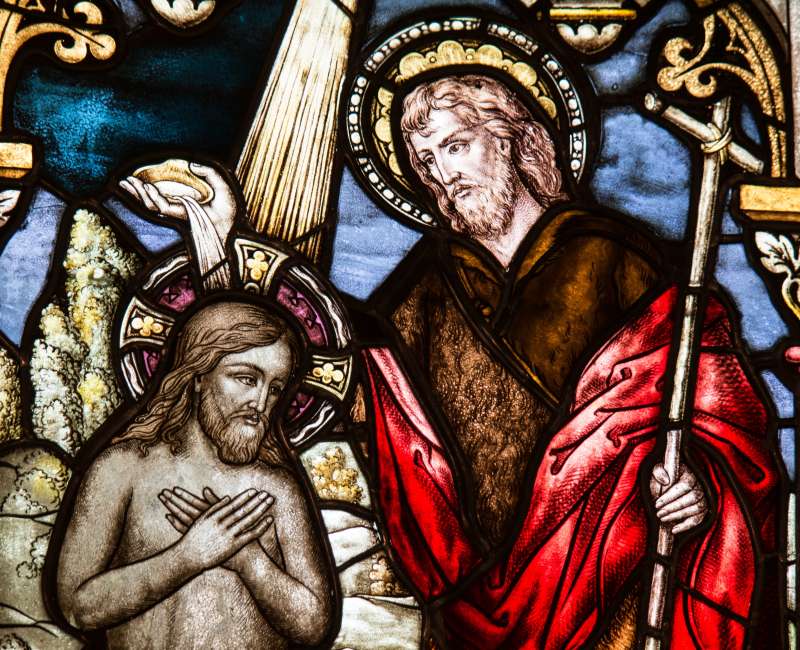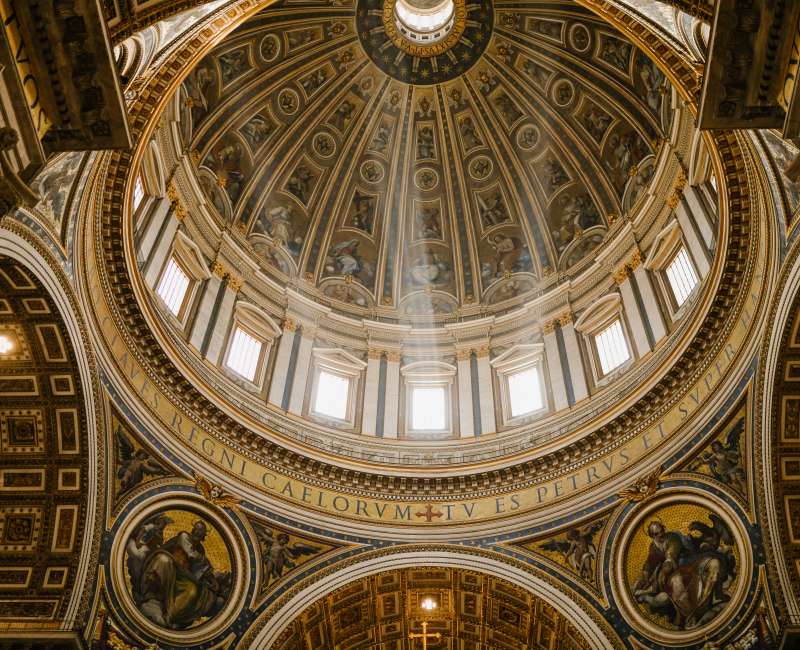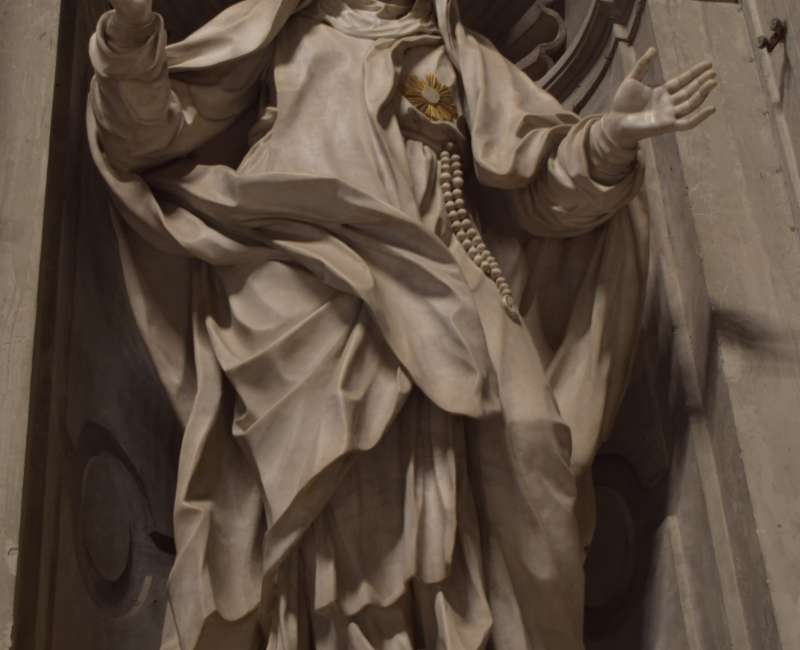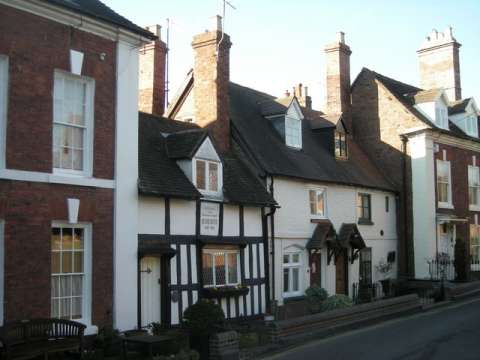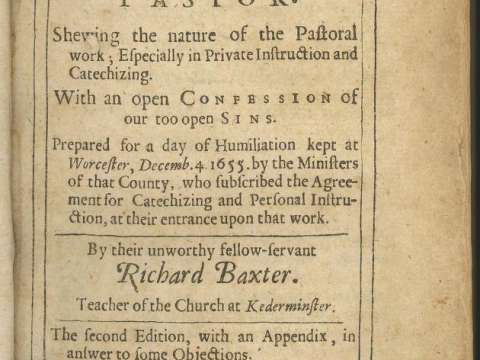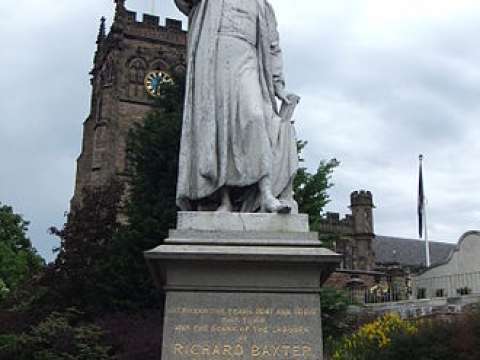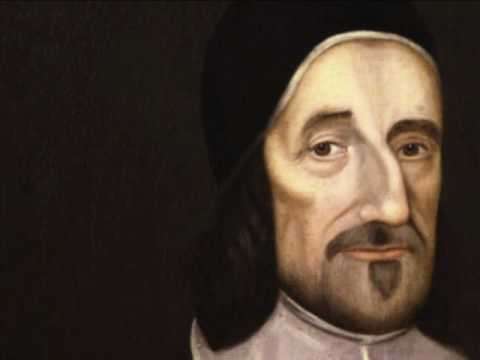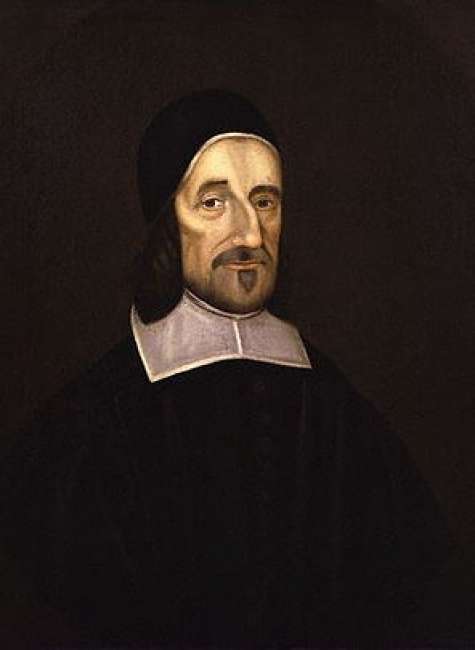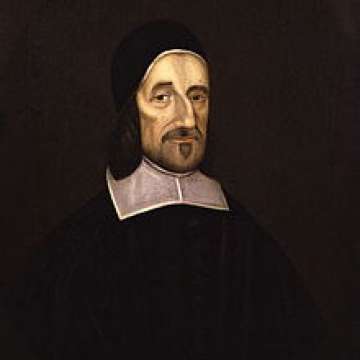

Richard Baxter (1615-1691)
Study hard, for the well is deep, and our brains are shallow.
Richard Baxter was an English Puritan church leader, poet, hymnodist, theologian, and controversialist. Dean Stanley called him "the chief of English Protestant Schoolmen". After some false starts, he made his reputation by his ministry at Kidderminster, and at around the same time began a long and prolific career as theological writer. After the Restoration he refused preferment, while retaining a non-separatist Presbyterian approach, and became one of the most influential leaders of the Nonconformists, spending time in prison. His views on justification and sanctification are somewhat controversial and unconventional within the Calvinist tradition because his teachings seem, to some, to undermine salvation by faith, in that he emphasizes the necessity of repentance and faithfulness.
Early life and education
Baxter was born at Rowton, Shropshire, at the house of his maternal grandfather probably on 12 November 1615, and baptised at its then parish church at High Ercall. In February 1626 he was removed to his parents' home now called Baxter's House in Eaton Constantine. Richard's early education was poor, being mainly in the hands of the local clergy, themselves virtually illiterate. He was helped by John Owen, master of the free school at Wroxeter, where he studied from about 1629 to 1632, and made fair progress in Latin. On Owen's advice he did not proceed to Oxford a step which he afterwards regretted, but went to Ludlow Castle to read with Richard Wickstead, chaplain to the Council of Wales and the Marches.
He was reluctantly persuaded to go to court, and he went to London under the patronage of Sir Henry Herbert, Master of the Revels, with the intention of doing so, but soon returned home, resolved to study divinity. He was confirmed in the decision by the death of his mother.
After three months spent working for the dying Owen as a teacher at Wroxeter, Baxter read theology with Francis Garbet, the local clergyman, adding to his reading initially in devotional writings, of Richard Sibbes, William Perkins and Ezekiel Culverwell, as well as the Calvinist Edmund Bunny at age 14, and then in the scholastic philosophers orthodox Church of England theology in Richard Hooker and George Downham, and arguments from conforming puritans in John Sprint and John Burges. In about 1634, he met Joseph Symonds assistant to Thomas Gataker and Walter Cradock, two Nonconformists.
Early ministry, 1638–1660
Dudley and Bridgnorth
In 1638, Baxter became master of the free grammar school at Dudley, where he commenced his ministry, having been ordained and licensed by John Thornborough, Bishop of Worcester. His success as a preacher was at first small; but he was soon transferred to Bridgnorth, in Shropshire, where, as assistant to a Mr Madstard, he established a reputation for vigorously discharging the duties of his office.

Baxter remained at Bridgnorth for nearly two years, during which time he took a special interest in the controversy relating to Nonconformity and the Church of England. He soon became alienated from the Church on several matters; and after the requirement of the "et cetera oath", he rejected episcopacy in its English form. He became a moderate Nonconformist; and continued as such throughout his life. Though regarded as a Presbyterian, he was not exclusively tied to Presbyterianism, and often seemed prepared to accept a modified Episcopalianism. He regarded all forms of church government as subservient to the true purposes of religion.
Kidderminster
One of the first measures of the Long Parliament was to reform the clergy; with this view, a committee was appointed to receive complaints against them. Among the complainants were the inhabitants of Kidderminster. The vicar George Dance agreed that he would give £60 a year, out of his income of £200, to a preacher who should be chosen by certain trustees. Baxter was invited to deliver a sermon before the people, and was unanimously elected as the minister of St Mary and All Saints' Church, Kidderminster. This happened in April 1641, when he was twenty-six.
His ministry continued, with many interruptions, for about 19 years; and during that time he accomplished many reforms in Kidderminster and the neighbourhood. He formed the ministers in the country around him into an association, uniting them irrespective of their differences as Presbyterians, Episcopalians and Independents. The Reformed Pastor was a book which Baxter published in relation to the general ministerial efforts he promoted.
The English Civil War
On the outbreak of the First English Civil War, Baxter blamed both parties and recommended the Protestation; but Worcestershire was a Royalist stronghold, and he was exposed to annoyance and danger in Kidderminster. He temporarily retired to Gloucester. On 23 October 1642, he was preaching at Alcester, during the Battle of Edgehill. He returned, only to be driven out again. He then moved to Coventry a Parliamentary stronghold. There he found himself with no fewer than 30 fugitive ministers, among whom were Richard Vines, Anthony Burges, John Bryan and Obadiah Grew. He officiated each Sunday as chaplain to the garrison, preaching a sermon each to the soldiery, and the townspeople and strangers. Included among the congregants were Sir Richard Skeffington, Colonel Godfrey Bosvile, George Abbot the layman scholar, and others. After the Battle of Naseby he took the situation of chaplain to Colonel Edward Whalley's regiment, and continued to hold it till February 1647. During these stormy years he wrote his Aphorisms of Justification, which on its appearance in 1649, excited great controversy. Of numerous critics the one with whom Baxter engaged most closely was Christopher Cartwright.

Baxter's connexion with the Parliamentary army was a very characteristic one. He joined it that he might, if possible, contract the growth of sectaries in that field, and maintain the cause of constitutional government in opposition to republican tendencies of the time. He regretted that he had not previously accepted Oliver Cromwell's offer to become chaplain to the Ironsides. Cromwell avoided him; but Baxter, having to preach before him after he had assumed the Protectorship, chose for his subject the old topic of the divisions of the church, and in subsequent interviews argued with him about liberty of conscience, and even defended the monarchy he had subverted. This contact with Cromwell occurred when Baxter was summoned to London to assist in settling "the fundamentals of religion".
In 1647, Baxter was staying at the home of Lady Rouse, wife of Sir Thomas Rouse, 1st Baronet, of Rous Lench, Worcestershire. There, though debilitated by illness, he wrote the most of a major work, The Saints' Everlasting Rest 1650. During this period he was also an energetic campaigner for the establishment of a new University in Shrewsbury but lack of funding prevented success.
Return to Kidderminster
On his recovery he returned to Kidderminster, where he also became a prominent political leader. His sensitive conscience led him into conflict with almost all the contending parties in state and church. An all-day debate on 1 January 1650, with John Tombes at Bewdley was attended by about 1500 people on each side and ended in confused disorder.
Ministry following the Restoration, 1660–1691
After the Restoration in 1660, Baxter, who had helped to bring about that event, settled in London. He preached there until the Act of Uniformity 1662 took effect, and looked for such terms of comprehension as would have permitted the moderate dissenters with whom he acted to have remained in the Church of England. In this hope he was sadly disappointed. The goal of comprehension was obstructed by forces on both sides: by conforming churchmen and dissenters alike. The Savoy Conference resulted in Baxter's Reformed Liturgy, though it was cast aside without consideration. Baxter continued to advocate for a comprehensive "national church", off and on, until his death.

The same reputation which Baxter had obtained in the country he secured in London. The power of his preaching was universally felt, and his capacity for business placed him at the head of his party. He had been made a king's chaplain, and was offered the Bishopric of Hereford, but he could not accept the offer without assenting to things as they were. After his refusal, he was not allowed, even before the passing of the Act of Uniformity, to be a curate in Kidderminster, and Bishop George Morley prohibited him from preaching in the Diocese of Worcester.
On 10 September 1662, Baxter married Margaret Charlton, a woman like-minded with himself. She died in 1681. In the same year Baxter wrote the words for the hymn Ye Holy Angels Bright in that year.
Legal troubles
From 1662 until the indulgence of 1687, Baxter's life was constantly disturbed by persecution of one kind or another. He retired to Acton in Middlesex, for the purpose of quiet study, but was placed in prison for keeping a conventicle. Baxter procured a habeas corpus in the court of common pleas.
He was taken up for preaching in London after the licences granted in 1672 were recalled by the King. The meeting house which he had built for himself in Oxendon Street was closed to him after he had preached there only once.
In 1680, he was taken from his house; and though he was released that he might die at home, his books and goods were seized. In 1684, he was carried three times to the sessions house, being scarcely able to stand, and without any apparent cause was made to enter into a bond for £400 in security for his good behaviour.
But his worst encounter was with the Chief Justice, Sir George Jeffreys, in May 1685. He had been committed to the King's Bench Prison on the charge of libelling the Church in his Paraphrase on the New Testament, and was tried before Jeffreys on this accusation. No authoritative report of the trial exists; if the partisan account on which tradition is based is accepted, Jeffreys was infuriated. Baxter was sentenced to pay 500 marks, to lie in prison till the money was paid, and to be bound to his good behaviour for seven years. Jeffreys is even said to have proposed he should be whipped behind a cart. Baxter was now approaching 70 years old, and remained in prison for 18 months, until the government, hoping to win his influence, remitted the fine and released him.
Later writings and last years
Baxter's health had grown even worse, yet this was the period of his greatest activity as a writer. He wrote 168 or so separate works, including major treatises such as the Christian Directory, the Methodus Theologiae Christianae, and the Catholic Theology. His Breviate of the Life of Mrs Margaret Baxter records the virtues of his wife and tenderness which otherwise might not have been known. A slim devotional work published in 1658 under the title Call to the Unconverted to Turn and Live formed one of the core extra-biblical texts of evangelicalism until at least the middle of the 19th century.
The remainder of his life, from 1687 onwards, was passed peacefully. He died in London and his funeral was attended by churchmen as well as dissenters.
Theology
Richard Baxter rejected the idea of a limited atonement in favour of a universal atonement, which drew him into a long debate with Calvinist theologian John Owen. Interpreting the kingdom of God in terms of Christ as Christus Victor and Rector of all men, Baxter explained Christ's death as an act of universal redemption penal and vicarious, though substitutionary in explication, in virtue of which God has made a new covenant offering pardon and amnesty to the penitent. Repentance and faith, being obedient to this covenant, are the conditions of salvation.
Baxter insisted that the Calvinists of his day ran the danger of ignoring the conditions that came with God's new covenant. Justification, Baxter insisted, required at least some degree of faith as the human response to the love of God.
Baxter's theology was set forth most elaborately in his Latin Methodus Theologiæ Christianæ London, 1681; the Christian Directory 1673 contains the practical part of his system; and Catholic Theology 1675 is an English exposition. His theology made Baxter very unpopular among his contemporaries and even into the next century caused a split among the Dissenters. As summarised by Thomas W. Jenkyn, it differed from the Calvinism on four points:
- The atonement of Christ did not consist in his suffering the identical but the equivalent punishment i.e., one which would have the same effect in moral government as that deserved by mankind because of offended law. Christ died for sins, not persons. The benefits of substitutionary atonement are accessible and available to all men for their salvation.
- The atonement is not limited to a select few, but is available to all who will believe in Christ.
- The righteousness that is imputed to the believer in the work of justification is not the righteousness of Christ, but is by virtue of the faith of the believer himself in Christ.
- Every sinner has a distinct agency of his own to exert in the process of his conversion, which is to believe in Christ.
Legacy
Richard Baxter is commemorated in the Calendar of saints of the Episcopal Church in the United States of America with a feast day on 8 December, but his feast day in the Church of England's Calendar of Saints is 14 June.
Literary legacy and mentions
AG Matthews, in an article "The Works of Richard Baxter: an Annotated List" Congregational Historical Society Transactions, XI 1932 lists 141 books written by Baxter. Geoffrey Nuttall, in his biography of Baxter, published in 1965, reproduces this list, noting that one of the listed works, Fasciculus literarum 1680, was, in fact, written by John Hinckley.
In 1674, Baxter cast in a new form the substance of Arthur Dent's book The Plain Man's Pathway to Heaven under the title, The Poor Man's Family Book. In this way, Arthur Dent of South Shoebury was a link between Baxter and another great Puritan John Bunyan.
In 1679 Baxter made one of the very few known allusions to Sir Thomas Browne's discourse The Garden of Cyrus, critically declaring to newly ordained priests, You shall have more.. solid truth than those in their learned Network treatises.
Baxter's influence in New England is referenced in the first chapter of the 19th century devotional work "I Will Be A Lady – a book for girls" by Mrs. Tuthill.
In George Eliot's Mill on the Floss Richard Baxter's "Saints Everlasting Rest" is listed as one of aunt Glegg's books.
Max Weber 1864–1920, the German sociologist, made significant use of Baxter's works in developing his thesis for "The Protestant Ethic and the Spirit of Capitalism" 1904, 1920. Robert K. Merton 1910–2003, founder of the sociology of science and well known for the so-called Merton Thesis, also followed Weber in making use of Baxter's Christian Directory as "a typical presentation of the leading elements in the Puritan ethos."
Monuments
Baxter's House in Bridgnorth is still standing near the High Street with a name plaque on the front.
The Richard Baxter Monument in the civic parish of Wolverley and Cookley neighbouring Kidderminster was built around 1850 in memory of Baxter. It is a Grade II listed structure and resides on a hilltop on Blakeshall Common.
The Baxter Monument is a Grade II listed structure in Kidderminster. This tribute of general esteem was erected nearly two centuries after Baxter's death, sculpted by Sir Thomas Brock and unveiled 28 July 1875. Originally in the Bull Ring, it was moved to its present site outside St Mary's parish church in March 1967.

The Baxter Monument in Rowton, Shropshire the village of his birth is a squat stone obelisk with a bronze plaque on which is written "Richard Baxter great divine author and eminent citizen of the 17th century. Son of Richard Baxter and Beatrice née Adney born here in Rowton AD 1615. Died in London 1691". It resides on a triangle of grass at the centre of the village and is probably of late 19th century construction. It was designated a Grade II listed structure in 1983. There is a portrait of Baxter in Dr Williams's Library, Gordon Square, London.
Baxter House, a boarding house at Old Swinford Hospital school in Stourbridge, is named after him. In Kidderminster, Baxter College formerly Harry Cheshire High School, and a public park, Baxter Gardens, are both named after him.

